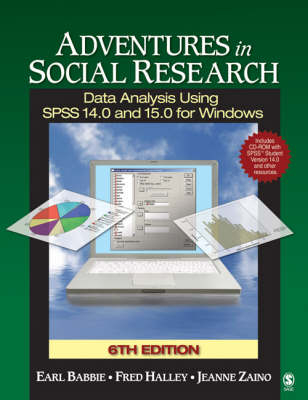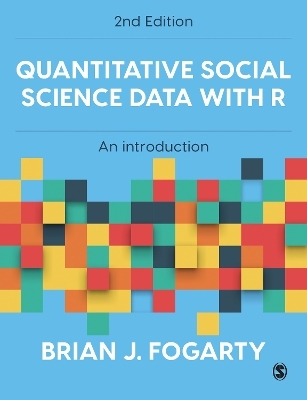
Adventures in Social Research
SAGE Publications Inc (Verlag)
978-1-4129-4083-2 (ISBN)
- Titel ist leider vergriffen;
keine Neuauflage - Artikel merken
Designed for both introductory and advanced research methods or statistics courses in sociology, political science, social work, criminal justice, and public health departments, Adventures in Social Research is an ideal computer skills and data analysis textbook for any discipline that uses survey methods.
New to the Sixth Edition:
-Provides a shorter, more condensed version than the Fifth Edition
-Illustrates uses of SPSS 14.0 and new GSS data sets
-Includes a CD-ROM that contains data sets, Designing Own Survey and comprehensive appendices that include questionnaires, research reports, proposals, survey tips, commands, readings and more
-Offers a Web page that features SPSS version update changes for students and instructors
Earl Babbie was born in Detroit, Michigan, in 1938, but his family chose to return to Vermont 3 months later, and he grew up there and in New Hampshire. In 1956, he set off for Harvard Yard, where he spent the next 4 years learning more than he initially planned. After 3 years with the US Marine Corps, mostly in Asia, he began graduate studies at the University of California—Berkeley. He received his PhD from Berkeley in 1969. He taught sociology at the University of Hawaii from 1968 through 1979, took time off from teaching and research to write full-time for 8 years, and then joined the faculty at Chapman University in Southern California in 1987. Although he is the author of several research articles and monographs, he is best known for the many textbooks he has written, which have been widely adopted in colleges throughout the United States and the world. He also has been active in the American Sociological Association for 25 years and currently serves on the ASA’s executive committee. He is also past president of the Pacific Sociological Association and California Sociological Association. Fred Halley, Associate Professor Emeritus, SUNY-Brockport, received his bachelor’s degree in sociology and philosophy from Ashland College and his master’s and doctorate degrees from Case Western Reserve University and the University of Missouri, respectively. Since 1970, he has worked to bring both instructional and research computer applications into the undergraduate sociology curriculum. Halley has been recognized for his leadership in the instructional computing sections of the Eastern and Midwest Sociological Societies and the American Sociological Association. At Brockport, he served as a collegewide social science computing consultant and directed Brockport’s Institute for Social Science Research and the College’s Data Analysis Laboratory. Off campus, Halley directed and consulted on diverse community research projects that were used to establish urban magnet schools, evaluate a Head Start family service center, locate an expressway, and design a public transportation system for a rural county. Now residing in Rochester, New York, he plays an active role in a faith-based mentoring program for ex-offenders, and he volunteers for Micrecycle, an organization that refurbishes computers used by those on the other side of the computer divide in schools, daycares, youth centers, and other community organizations. Jeanne Zaino, Associate Professor of Political Science, Iona College, earned a bachelor’s degree in political science and a master’s degree in survey research at the University of Connecticut—Storrs. During that time, she worked as a research assistant at the Roper Center for Public Opinion Research. She went on to earn a master’s degree and PhD in political science from the University of Massachusetts—Amherst. She is currently chair of the Political Science Department at Iona College in New Rochelle, New York, where she teaches courses in American government, institutions, research methods, social statistics, public opinion, scope, and methods. She and her husband, Jeff, are the proud parents of two sons, Maxim and Logan.
Part I Preparing for Data Analysis
Chapter 1 Introduction: The Theory and Practice of Social Research
Chapter 2 The Logic of Measurement
Chapter 3 Description of Data Sets: The General Social Survey
Part II Univariate Analysis
Chapter 4 Using SPSS: Some Basics
Chapter 5 Describing Your Data: Religiosity
Chapter 6 Presenting Your Data in Graphic Form: Political Orientations
Chapter 7 Recoding Your Data: Religiosity and Political Orientations
Chapter 8 Creating Composite Measures: Exploring Attitudes Toward Abortion in More Depth
Chapter 9 Suggestions for Further Analysis
Part III Bivariate Analysis
Chapter 10 Using Crosstabs to Examine the Sources of Religiosity
Chapter 11 Political Orientations as Cause and Effect
Chapter 12 What Causes Different Attitudes Toward Abortion?
Chapter 13 Measures of Association
Chapter 14 Tests of Significance
Chapter 15 Suggestions for Further Bivariate Analyses
Part IV Multivariate Analysis
Chapter 16 Multiple Causation: Examining Religiosity in Greater Depth
Chapter 17 Dissecting the Political Factor
Chapter 18 A Powerful Prediction of Attitudes Toward Abortion
Chapter 19 Suggestions for Further Multivariate Analyses
Part V The Adventure Continues
Chapter 20 Designing and Executing Your Own Survey
Chapter 21 Further Opportunities for Social Research
| Erscheint lt. Verlag | 27.3.2007 |
|---|---|
| Verlagsort | Thousand Oaks |
| Sprache | englisch |
| Maße | 215 x 279 mm |
| Gewicht | 1050 g |
| Themenwelt | Mathematik / Informatik ► Mathematik ► Computerprogramme / Computeralgebra |
| Sozialwissenschaften ► Soziologie ► Empirische Sozialforschung | |
| ISBN-10 | 1-4129-4083-4 / 1412940834 |
| ISBN-13 | 978-1-4129-4083-2 / 9781412940832 |
| Zustand | Neuware |
| Haben Sie eine Frage zum Produkt? |
aus dem Bereich


